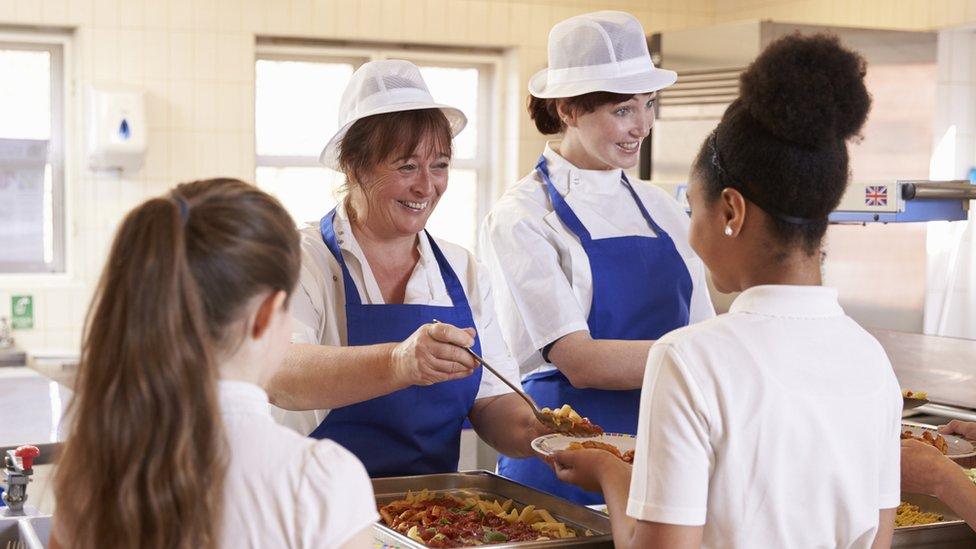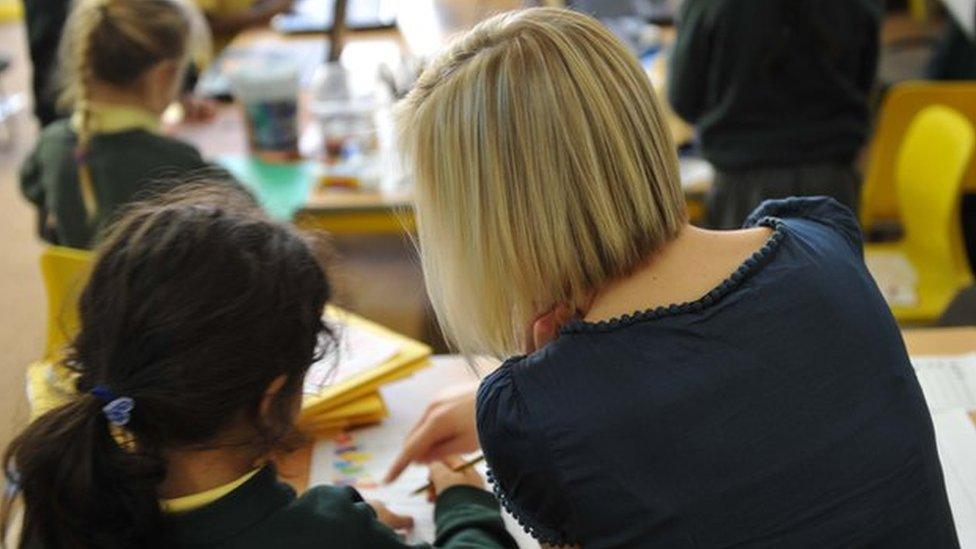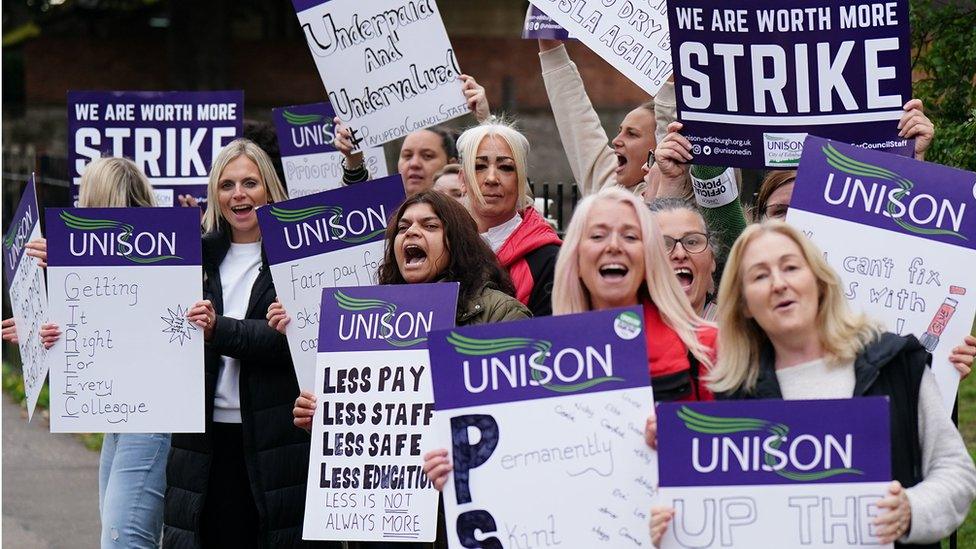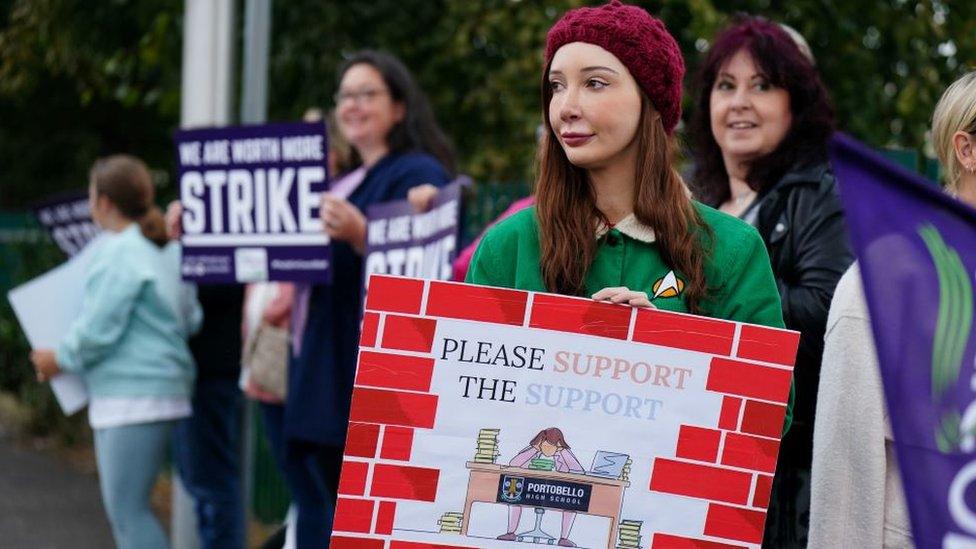School strikes announced in more Scottish councils
- Published

The dispute involves school catering, cleaning, janitorial, admin and classroom assistance staff
Further strikes by school support staff in Scotland have been confirmed in four council areas.
Unison announced action on Wednesday 8 November in South Lanarkshire, Dumfries and Galloway, Edinburgh and Fife.
It comes after walk outs were confirmed for 1 November in Glasgow City, Renfrewshire, East Renfrewshire and Inverclyde in a dispute over pay.
A revised pay offer was made by Cosla and previously accepted by Unite and GMB members.
Following the latest strike announcement, Cosla said the offer on the table was "as far as local government can go".
And First Minister Humza Yousaf said there would be no extra money for local authorities to offer increased pay to staff.
The industrial dispute involves non-teaching staff including catering, cleaning, pupil support, administration and janitorial workers in schools and early years centres.
In September, more than 21,000 Unison members went on strike for three days at 1,868 schools.
Thousands of pupils were told to stay at home.
Unison Scotland's head of local government Johanna Baxter said there had been no invitations from Cosla or the Scottish government to have "exploratory talks".
Although the Scottish government allocates council funding, it does not decide the pay of council staff.
Ms Baxter said: "The union is committed to reaching a resolution to this dispute as soon as possible.
"And there is still time for Cosla and the Scottish government to get back round the negotiating table to explore every avenue to reaching a negotiated settlement and avoid further disruption for parents and students.
"The strength of feeling amongst Unison's 91,000 local government members, who voted overwhelmingly to reject Cosla's latest pay offer, is clear. They are determined to continue to fight to get an improved pay offer."
Ballot warning
Councillor Katie Hagmann, Cosla's resources spokesperson said the ballot result from Unison was disappointing "given the strength of the offer on the table".
She said: "Firstly, Scotland's council leaders value their workforce.
"Secondly, we have listened to our trade unions, met all their asks and worked with Scottish government to put an incredibly strong half a billion pound pay package on the table - which our other trade union partners have voted to accept.
"Finally, offering almost 10% or a £2,006 pay increase for our lowest paid workers, which the unions specifically asked for, and £1,929 or at least 5.5% for everyone else is as far as local government can go without impacting on essential services and jobs locally."
Meanwhile, the first minister said the Scottish government was not in a position to provide any additional money.
He added: "There is no more funding, I've been really clear about that.
"We have significant additional funding in order to get a really good pay deal on the table for our local government workers, and that's why two out of three trade unions have accepted the deal."
Unison is also warning that it may ballot other council workers on strike action if the dispute is not settled.
In a letter to council leaders the union said: "Unison's local government committee are already exploring escalation of the dispute and strike action by our members as a consequence of this decision. Our existing strike mandate covers 75% of Scotland's schools.
"You have already been notified that we already have a rolling programme of action, utilising this existing mandate, to the end of this year. We have not ruled out escalating the number of strike days and/or balloting additional groups of workers."


The council pay dispute rumbles on.
Unison now plans one-day strikes in a total of eight council areas over the next fortnight. More dates are likely to be announced within days and, potentially, as many as 24 council areas could be affected at some point.
The strikes are likely to lead to yet more school closures - weeks after students lost three school days because of Unison strikes and only months after the resolution of the teachers' pay dispute.
The two other main council unions - Unite and the GMB - have accepted the pay offer.
Unison has two concerns - the pay offer itself and the fear that councils will need to make more cuts to pay for it.
So what hope is there of a resolution?
A better pay offer would seem unlikely without more Scottish government money for councils.
Meanwhile the government's planned council tax freeze has, for now, made it harder for councils to work out what their finances may be like next year. They are still waiting to find out just how much they will get from the government to pay for the freeze.
- Published18 October 2023

- Published16 October 2023

- Published27 September 2023
